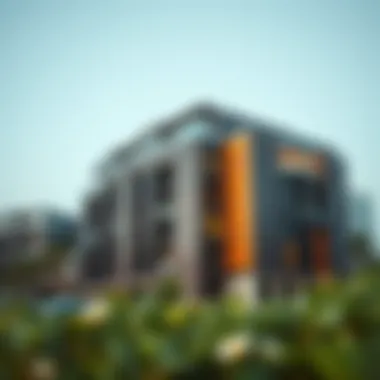Analyzing Dubai's Property Prices: Trends and Insights


Intro
Navigating the property market in a city as dynamic as Dubai requires more than just a hunch or a quick glance at the latest listings. This city, with its towering skyscrapers and luxury developments, offers a complex tapestry of real estate opportunities influenced by a myriad of factors. From expatriate demand to visionary government policies, every thread in this fabric shapes property prices in unique ways.
As excitement brews around the prospect of buying a home or making a strategic investment, understanding the intricate details becomes crucial. This analysis goes beyond simple numbers, diving into the depths of the local market, evaluating current trends, and forecasting what lies ahead. With a keen eye on both the high-end and mid-tier segments, potential buyers and seasoned investors will find valuable insights that inform their decisions and expectations.
Why This Matters
In recent years, Dubai's real estate landscape has shifted dramatically. Many factors—like evolving demographics, international economic conditions, and changing tourism patterns—have all been key players. Each district offers its own subtle nuances in terms of prices, amenities, and neighborhood vibes. Hence, this analysis aims to grant readers a nuanced understanding of property prices across various locales.
A deep dive into the market can help potential investors gauge viability around their purchases, now and in the future. The goal is to equip readers with the knowledge they need, whether they are first-time buyers, seasoned investors, or property managers looking to expand their portfolios. Get ready to explore the complexities of Dubai's property prices like never before.
Prelims to Dubai's Real Estate Landscape
Understanding the dynamics of Dubai's real estate landscape is crucial for anyone interested in property investment or market trends. Dubai stands as a vibrant hub that attracts investors from around the globe. It's not just its stunning skyscrapers and luxurious lifestyle that entice buyers; the economic stability, strategic location, and robust infrastructure make it a hotbed for real estate activity. As the city continues to evolve, having insights into its property landscape becomes invaluable.
Overview of the Real Estate Market
The Dubai real estate market is characterized by a staggering array of properties, ranging from opulent villas in Palm Jumeirah to urban apartments in Downtown Dubai. Each district possesses its unique allure and market characteristics depending on what one seeks — be it a long-term residence or a lucrative rental investment.
Over the past few years, we have seen a mix of buyer demands, which directly impacts prices across different segments. According to recent reports, certain areas have begun to show a resurgence in sales, while others remain under pressure due to an oversupply of properties. This diverse behavior in the market is a telling sign that potential investors need to conduct solid research.
"The real estate in Dubai isn't just about bricks and mortar; it’s a living hypothesis where market dynamics reshape seasonally."
Economic Factors Influencing Prices
Several economic factors substantially influence property prices in Dubai. One of the first elements to consider is the growth rate of the UAE economy. As oil prices and tourism revenues fluctuate, they can either bolster or hinder investment sentiments. Investors often keep a close eye on GDP growth indicators; a robust economy generally leads to increased confidence in real estate investments.
Additionally, foreign investment plays a pivotal role. Dubai has drawn in a wealth of expatriates, thanks to its liberal property laws and favorable tax environment. The ability for foreign nationals to own freehold properties in designated areas attracts a global audience, which adds fuel to the demand flames.
Other factors include:
- Currency Strength: The strength of the UAE Dirham against other currencies can impact foreign buyer interest. A strong Dirham makes purchasing power for expatriates more challenging, whereas a weaker currency can attract more buyers.
- Interest Rates: Fluctuations in loan interest rates also shape property affordability, directly affecting overall demand.
- Government Policies: Initiatives to stimulate investment, such as residency visas tied to property investments, enhance market attractiveness.
Without understanding these economic nuances, investors run the risk of making uninformed decisions that could affect their financial future.
Factors Affecting Property Prices
In the intricate world of real estate, various elements come together like different colors in a palette, each influencing property prices in their own unique way. Understanding these factors is essential for potential buyers, investors, and indeed anyone keeping a pulse on Dubai's dynamic property market. When discussing the factors affecting property prices, we cannot overlook how interconnected these variables are, reflecting not just local market dynamics but also global trends.
Location and Accessibility
Dubai is a sprawling metropolis, where location is paramount. Being close to vital hubs, like business districts or social hotspots, can dramatically affect property values. For instance, areas such as Downtown Dubai, with its famous Burj Khalifa, command premium prices due to their enviable location and the accessibility they offer.
- Proximity to transport: Properties located near metro stations or major highways often enjoy higher demand. Residents tend to favor convenient access modes, reducing commute times.
- Neighborhood appeal: Some areas, like Dubai Marina, are sought after not just for their scenic views but also for vibrant community life. This brings about a premium in pricing, as areas that project a lively atmosphere often attract affluent buyers.
Infrastructure Developments
As the saying goes, "you can’t build a house on sand." Infrastructure plays a crucial role in property valuation as it bolsters the livability and convenience of an area. The ongoing projects in Dubai, such as roads, schools, and hospitals, enhance the desirability of neighborhoods.
- Transport links: The expansion of the metro and increasing number of road networks are attractive features for investors and potential homeowners alike. Areas seeing major infrastructure investments often see promising appreciation rates.
- Public amenities: Proximity to schools, parks, and shopping centers not only heightens the appeal of a property but also ensures a stable demand. Developments in amenities sway buyer decisions, often leading to a rise in property prices in well-equipped regions.
Market Demand and Supply
A well-known adage in the real estate world states: "The real estate market is like a seesaw; when demand increases, prices follow suit." In Dubai's ever-evolving landscape, the balance between supply and demand is a delicate dance that greatly impacts property prices.
- High demand: With a growing expatriate community and increasing interest from international investors, demand for real estate continues to climb. Areas with fast-paced development often see prices reflecting this surge.
- Current supply: On the flip side, an oversupply of properties can lead to a dip in prices, pushing developers to offer attractive deals to entice buyers. It's crucial for investors to keep a finger on the pulse of these trends to make well-informed decisions.


"Understanding the nuances of market demand and supply is not just business; it’s about predicting the unpredictable." – Unknown
Price Ranges by District
Understanding property prices in different districts of Dubai is crucial for anyone interested in the real estate market. Each area has its own unique characteristics, which significantly influence pricing dynamics. Knowing these variations can help buyers and investors make informed decisions, targeting districts that fit their budget and investment goals. Moreover, recognizing the local amenities, culture, and trends within each district can unveil hidden opportunities and enhance investment returns.
Downtown Dubai
Residential vs Commercial Prices
When it comes to pricing distinctions, a notable contrast exists between residential and commercial properties in Downtown Dubai. Residential prices tend to attract families and young professionals who desire proximity to the vibrant lifestyle this area offers. On the flip side, commercial real estate prices are often driven by corporate demand as businesses flock to this bustling hub. The key characteristic here is the premium pricing for living close to iconic landmarks like the Burj Khalifa and Dubai Mall.
Investors often find that residential properties yield strong rental returns, especially given the influx of expatriates and tourists. However, the disadvantage might be that the initial investment can be steep, requiring careful financial planning.
Luxury Market Overview
The luxury market in Downtown Dubai is a league of its own, making it an enticing option for both local and foreign investors. High-end developments not only offer attractive amenities but also command premium prices due to their exclusivity and prestige. The key selling point for luxury properties here often lies in their spectacular views and lavish living spaces.
While this market promises substantial returns, potential investors should keep an eye on the volatility that can accompany luxury pricing. An economic downturn might leave premium properties collecting dust, which is a risk that must be weighed.
Dubai Marina
Trends in Waterfront Properties
Dubai Marina stands out as a hotspot for waterfront properties, appealing to those drawn to the allure of views and a dynamic lifestyle. Investors have noticed an uptick in demand for developments along the waterfront, as these properties frequently offer exclusive amenities, like pools overlooking the sea and easy access to beach activities. This area is often perceived as a beneficial choice due to its vibrant community and lifestyle, making it attractive for long-term investments.
However, with high demand comes high competition. Potential buyers need to act quickly upon seeing suitable properties, as they can be snapped up faster than one might think, especially as tourists continue to flock to this area.
Average Rent Prices
The rental landscape in Dubai Marina is an indicator of the economic health of the area. Average rent prices for properties in this district are generally on the higher side, thanks to the area's appeal and desirability among expatriates. A clear benefit of renting in Dubai Marina is the versatility it offers—prospective renters can choose from glamorous one-bedroom apartments to sprawling penthouses.
Yet, the downside of these high prices is that they can overshadow potential renters’ budgets, forcing them to seek areas that may not be as central or luxurious.
Palm Jumeirah
High-End Apartments
This iconic man-made island epitomizes luxury living. High-end apartments here boast stunning views of the Arabian Gulf, making them highly sought after by affluent buyers. The premium on these properties comes with a key characteristic of unparalleled exclusivity and high-quality amenities. Buyers here also enjoy a lifestyle that offers proximity to upscale facilities such as fine dining and private beaches.
The main advantage here is the status associated with living in such a prestigious location, though a significant disadvantage can be the prohibitive cost—it might stretch budgets to their limits.
Villa Market Analysis
Palm Jumeirah's villa market is equally enticing, offering expansive living spaces and private access to the beach. Families looking for room to grow often gravitate toward these properties. The unique feature of villas in this area is the sense of privacy they provide amidst the opulence. Additionally, villa owners often enjoy proximity to top-tier schools and leisure facilities.
However, the challenge lies in the financial commitment required for such properties. Keeping an eye on maintenance costs and property taxes can easily become overwhelming if not properly managed.
Jumeirah Beach Residence
Tourist Demand Impact
As a prime destination for tourists, Jumeirah Beach Residence (JBR) sees significant fluctuations in demand that influence property prices. This area's appeal lies in its waterfront views, easy beach access, and proximity to various establishments like hotels and restaurants. An increase in tourists translates into higher short-term rental prices, offering landlords excellent returns.
The key characteristic here is that investors can capitalize on the tourist influx for passive income—particularly during peak travel seasons. However, the risk includes being significantly affected by global events that can drastically affect tourism.
Property Price Fluctuations


Jumeirah Beach Residence is susceptible to seasonal price fluctuations. Understanding these variations is crucial when considering investments here. Property prices can soar during peak tourist seasons, resulting in attractive returns for landlords. The advantage of this volatility is the potential for high yields, but it also brings the disadvantage of uncertain cash flow during off-peak months.
Al Nahda and Other Emerging Areas
Value for Money Properties
Al Nahda is often overlooked, but it offers some of the best value-for-money properties in Dubai today. Choices here range from cozy apartments to larger family homes, all at competitive prices compared to more prominent districts. The key element making it appealing is the affordability without sacrificing quality or access to amenities.
However, the downside might include a trade-off in lifestyle appeal and the potential for slower capital appreciation compared to more established areas.
Growth Potential
Emerging neighborhoods like Al Nahda are witnessing consistent growth, driven by ongoing developments and the government's focus on enhancing infrastructure. Investors are finding that properties in these regions have significant growth potential as demand for housing continues to rise. The advantage here is being an early entrant in a rapidly developing market, while the disadvantage may include uncertainty around long-term plans and investor interest.
Comparative Analysis with Global Cities
Understanding how Dubai’s property market stands in relation to global cities is crucial for those considering investing or purchasing property in the area. This comparative analysis not only highlights Dubai’s unique characteristics but also places it alongside other major urban centers like London, New York, and Singapore. This section dives into price comparisons and market stability, both of which offer prospective buyers valuable insights into potential investments.
Dubai Versus Other Major Cities
Price Comparisons
Price comparisons are an essential aspect of real estate analysis, especially for individuals looking to make informed decisions. Dubai's property prices can be both alluring and intimidating based on how they stack up against cities like Hong Kong or Sydney. In recent years, Dubai has carved out a niche as a relatively affordable option for luxury living compared to these cities.
One key characteristic of price comparisons is the juxtaposition of high-end apartments in Dubai against similarly luxurious offerings in other cities. For instance, a two-bedroom apartment in the city center of Dubai can be upwards of AED 1.5 million, while in London, the same might fetch closer to AED 2.5 million or more. This significant difference makes Dubai an attractive visit for high-net-worth individuals looking for better value for their investments.
However, the overall price might be misleading, as the cost of living varies greatly. Property prices may be lower in Dubai, but maintenance and additional charges often surprise newcomers, nudging overall investment costs upward.
Market Stability Analysis
Market stability analysis examines the robustness of Dubai’s real estate market relative to fluctuations in other global cities. Stability is characterized by demand-supply dynamics, economic indicators, and regulatory framework. Dubai is often viewed as a metastable environment due to its vast diversification efforts on economic fronts, from tourism to hospitality.
Notably, Dubai's real estate market has displayed remarkable recovery post-2014 when prices began their downward trending. Contrarily, both London and Hong Kong face fluctuating markets driven by political uncertainties and global economic pressures, making Dubai an appealing prospect for those wary of volatility. However, some might argue that while stability breeds confidence, it could also lead to complacency in investors. Moreover, regulations regarding property ownership can ebb and flow, potentially influencing expat investment.
Expats and Property Purchases
Foreign Ownership Regulations
Foreign ownership regulations play a significant role in defining Dubai's property market landscape. Unlike many countries, which impose stringent restrictions, Dubai offers an advantageous structure that allows foreign nationals to invest in designated areas freely. This characteristic positions Dubai as a hotbed for international investments, making it a popular choice particularly among expatriates looking for blended lifestyles between work and leisure.
An important aspect to underline is the fact that zone restrictions apply, meaning not all areas are available for outright purchases. However, the vibrant freehold ownership zones offer a good balance that benefits both the expats and the locals.
On the downside, the intricacies of these regulations can confuse first-time buyers. It's essential for potential investors to engage with local real estate experts to navigate the specifics.
International Investor Interest
International investor interest signifies a growing confidence in Dubai’s real estate market. As Dubai continues to expand its economic landscape, it increasingly attracts foreign entities seeking property as a symbol of wealth and investment diversification. This interest transcends the conventional appeal of luxury; many investors are drawn to the SDLT (Stamp Duty Land Tax) exemptions and business-friendly initiatives.
One unique feature of this interest is the emphasis on investment security, which the Dubai government aims to bolster through promising long-term plans. Unfortunately, this can lead to an environment where speculative transactions overstimulate price inflation, making it challenging for end users to enter the market.
Ultimately, potential buyers should weigh both opportunities against the backdrop of benefits and challenges they pose.
"Dubai's real estate market, while attractive, requires a firm grasp of the local laws and market conditions to ensure a sound investment."
In summation, conducting a thorough comparative analysis with global cities enriches the understanding of Dubai’s property prices. By examining price comparisons and international investment regulations, one can unravel both the challenges and opportunities that lie within the Dubai property market.
Future Outlook of Property Prices


Understanding the future of property prices in Dubai holds significant weight for investors and homebuyers alike. The real estate market in Dubai is a dynamic landscape, influenced by various internal and external factors. By closely examining predictions and potential challenges, stakeholders can make informed decisions that align with long-term objectives. This section aims to distill critical insights that highlight anticipated trends and looming hurdles.
Predicted Market Trends
As we peer into the crystal ball of Dubai's property market, several trends seem to be shaping the horizon:
- Continued Urbanization: With the population growing steadily, especially among expatriates, demand for housing is expected to remain high. The influx of people searching for job opportunities and lifestyle upgrades could drive prices upward.
- Sustainability in Development: There's been a noticeable shift toward sustainable building practices. The government's push for eco-friendly initiatives could redefine property valuations, making green buildings more sought after and potentially more expensive.
- Smart Homes and Technological Integration: The emergence of smart home technology—like security systems and energy-efficient appliances—are becoming a desirable feature. Property equipped with such integrations may command a premium in the market.
- Government Initiatives: The Dubai government continues to roll out new policies aimed at attracting foreign investment, like long-term visas for investors. These incentives can create more robust demand for high-end properties.
The prediction is not about the crystal ball but about trends backed by data and policy shifts.
Potential Challenges Ahead
Despite the optimistic view of future trends, investors should remain cautious and aware of potential obstacles:
- Economic Slowdown: Global economic fluctuations may affect Dubai's market. A downturn could lead to decreased demand, impacting prices negatively.
- Over Supply Concerns: While development is crucial, there exists a risk of oversaturation in certain districts. If supply exceeds demand, property values may suffer, leading to a drop in rental yields and resale values.
- Regulatory Changes: Shifting laws around property ownership and taxation could deter foreign buyers. Keeping a finger on the pulse of regulatory environments is essential.
- Geopolitical Factors: Regional stability plays a significant role in investment decisions. Political unrest or uncertain international relations can dissuade investors, impacting demand.
Investment Opportunities
The concepts of investment and opportunity often dance together in the bustling markets of Dubai. This city presents a unique mosaic for investors, where rapid economic growth and an influx of expatriates pump life into the real estate sector. By identifying the right opportunities, astute investors can secure not just a property, but a piece of Dubai's bright future.
"In the heart of the desert, Dubai stands as a beacon of growth, where every investment tells a story of potential."
Why Explore Investment Opportunities?
Understanding investment opportunities in Dubai is crucial, especially for those who are new to its market dynamics. Factors such as governmental policies favoring foreign investments, tax benefits, and the overall economic stability play a monumental role. The ease of doing business, coupled with a strong regulatory framework, enhances the attractiveness of the property market here. Additionally, the city's tourism, commercial activities, and diverse job market create a continuous demand for both residential and commercial properties.
Best Areas to Invest
When considering where to pour your investment dollars, some areas in Dubai stand out due to their promising returns and growth trajectories.
- Downtown Dubai: Home to the iconic Burj Khalifa, investments here seem almost like a no-brainer. The area is not just a tourist magnet, but a buzzing commercial hub that offers properties commanding premium prices, depending largely on location and amenities.
- Dubai Marina: The fusion of waterfront living and luxury blends perfectly in Dubai Marina. It's a hotspot for expatriates, ensuring steady rental income through high demand.
- Dubai Investment Park: This area appeals to a different crowd - businesses and manufacturers looking for industrial space. With strategic advantages in logistics and proximity to major transport links, it's a wise choice for those targeting commercial investments.
- Jumeirah Village Circle: A more affordable option that has been on the rise. This area captures the hearts of families and young professionals who are seeking community living with access to amenities without breaking the bank.
It's advisable to conduct thorough research and consider factors like market trends, rental demand, and infrastructure development when identifying the best areas for investment.
Rental Yields and Returns
Investors often look at rental yields as an indicator of their property's performance. In Dubai’s evolving landscape, the yields can be enticing. Currently, areas like Dubai Marina and Downtown Dubai often report yields between 6% to 7%, which is quite competitive on a global scale.
To enhance your understanding of potential returns, here are some key insights:
- Long-term Rentals: These properties often bring stability with signed agreements that ensure a steady flow. Especially in areas populated by families and expats, the demand remains high.
- Short-term Rentals: With the rise of platforms like Airbnb, short-term rental properties have leverage to not only achieve higher returns but also attract tourists in peak seasons. Interestingly, Dubai's tourism flourishes around festivals and events, which can lead to price surges during those times.
- Emerging Markets: Areas like Al Nahda, which were once considered under the radar, are seeing investment due to upcoming developments and increasing accessibility. Prices are gradually rising, leading to a win-win situation for early investors.
The key takeaway for potential investors is to balance the risk with expected returns. By researching markets and staying informed, investors can confidently navigate Dubai's property landscape and capitalize on its opportunities.
Furthermore, always consult local property experts and consider current market analysis to make well-informed decisions.
Ending
Understanding the intricacies of property prices in Dubai is essential for anyone vested in this bustling market, whether they are investors, homebuyers, or property managers. The findings from this article reveal not just numbers, but also the contextual elements driving those figures.
Summation of Key Insights
Throughout this examination, several key insights emerged:
- Dynamic Pricing: Dubai's real estate prices are shaped by an interplay of numerous factors, from global economic conditions to local market dynamics. Each district presents its unique landscape of pricing based on demand, accessibility, and amenities.
- Investment Potential: Certain neighborhoods promise higher returns, notably in areas with upcoming infrastructure projects or burgeoning commercial activity. For instance, Downtown Dubai continues to attract significant foreign investment due to its luxury developments and central location.
- Regulatory Landscape: It’s vital to stay abreast of the changing regulations regarding foreign ownership. Understanding these rules can sharpen investment strategies and mitigate risks.
- Market Cycles: Property prices are subject to cycles that can fluctuate due to various external economic pressures. Monitoring these cycles can provide insight into optimal buying or selling times.
In essence, the comprehensive data gathered presents a mosaic of opportunities and challenges that potential stakeholders must navigate in the Dubai property market.
Final Thoughts on Investing in Dubai
Investing in Dubai's property market is not for the faint-hearted. The mix of high-demand areas like the Palm Jumeirah and emerging neighborhoods like Al Nahda requires a strategic approach.
Before diving into transactions, consider the following:
- Research is Key: Equip yourself with detailed knowledge of regions and trends. Resources like Wikipedia and real estate platforms offer valuable insights.
- Professional Guidance: Hiring a knowledgeable real estate agent who understands local nuances can be invaluable. They can provide data and advice tailored to your specific investment goals.
- Long-Term View: Real estate is often a long-game, requiring patience to realize profits. Buyers should factor in their plans for the future and local development projections, noting that certain areas may take time to truly appreciate in value.
A careful assessment of these elements can set you on a promising path in Dubai's vibrant property market, where opportunity and growth continually beckon.















